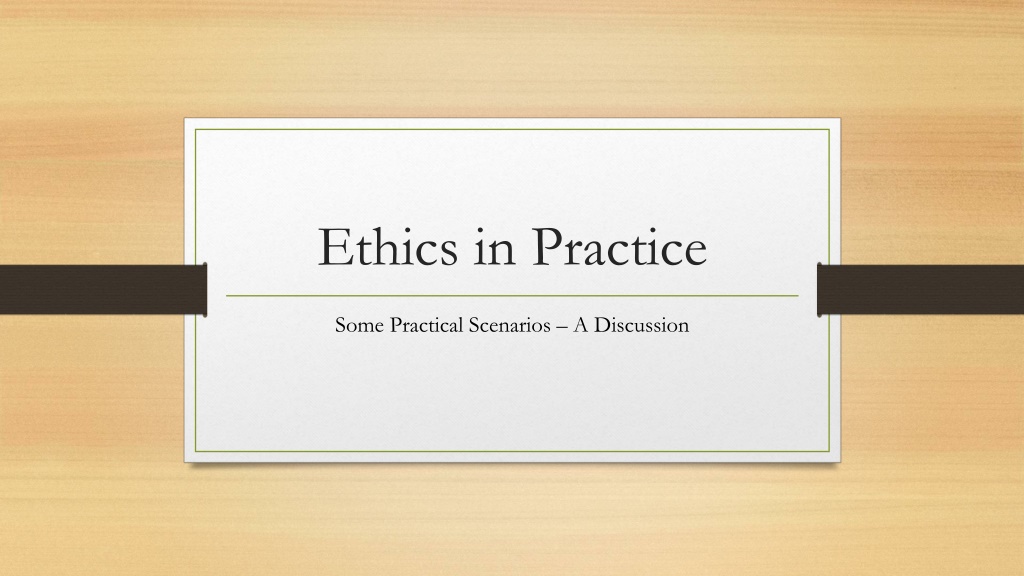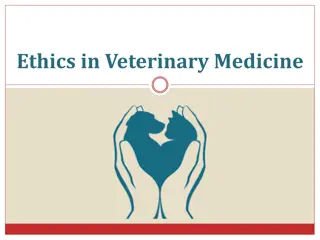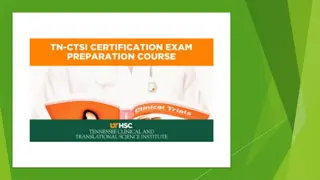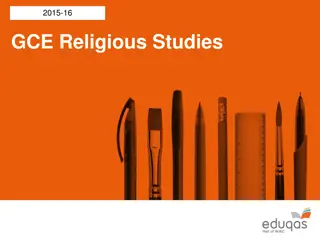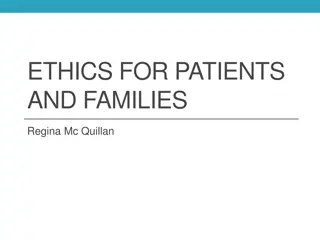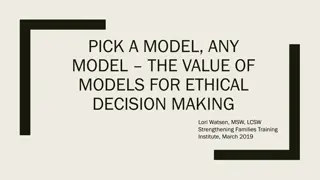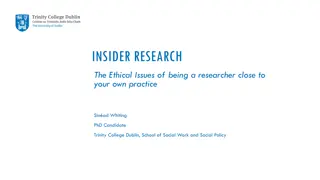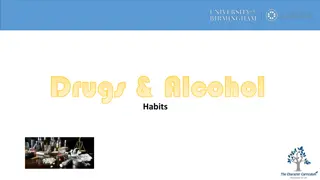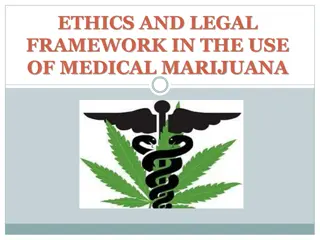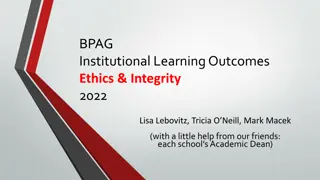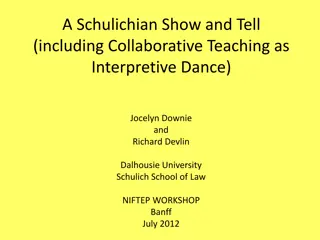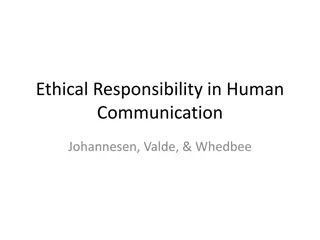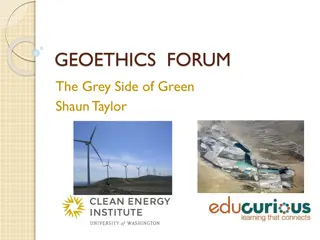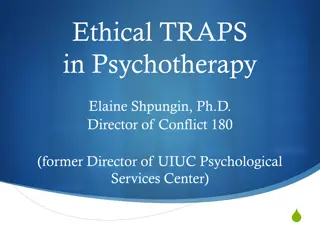Exploring Ethical Dilemmas in Legal Practice
Delve into practical scenarios and ethical issues faced by lawyers, examining the balance between ethics, justice, and professional responsibilities. From the importance of gut instincts to navigating complex ethical considerations, this discussion prompts reflection on the nuances of legal ethics.
Download Presentation

Please find below an Image/Link to download the presentation.
The content on the website is provided AS IS for your information and personal use only. It may not be sold, licensed, or shared on other websites without obtaining consent from the author. Download presentation by click this link. If you encounter any issues during the download, it is possible that the publisher has removed the file from their server.
E N D
Presentation Transcript
Ethics in Practice Some Practical Scenarios A Discussion
Purpose Promote discussion Not to give legal advice!!! Think about how we approach ethical issues
Introduction The attainment of justice cannot be viewed solely through a client s lenses, divorced and detached from the solicitor s professional functions and obligations to ensure the attainment of justice. Public Trustee v By Products Traders Pte Ltd [2005] 3 SLR(R) 449 at [56]
Rebuttal The very reason I get lowlife crooks off is because I care about the law. It s justice I don t give a toss about. Cleaver Greene
A checklist Trust your gut The rules - Legal Profession Uniform Law Australian Solicitors Conduct Rules 2015, the Legal Profession Uniform Conduct (Barristers) Rules 2015, and the Legal Profession Uniform Legal Practice (Solicitors) Rules 2015 G E Dal Pont Lawyers Professional Responsibility 7thEd, Lawbook Co 2021 Speak to a senior solicitor Speak to a Public Defender or a senior member of the Bar Call or email the NSW Law Society Ethics line - (02) 9926 0114, ethics@lawsociety.com.au Take filenotes
Scenario One ethical conduct? Has the lawyer acted ethically? What is our gut reaction? Online survey
Scenario One the issues What are the ethical issues? Speaking to the prosecution witness without raising it with the prosecutor Solicitors Rules 2015 generally silent on this Go to case law
Scenario One no property in witnesses Eye witnesses do not belong to a camp, but are within the class of persons whom juries expect and are entitled to hear from. R v Shaw (1991) 57 A Crim R 425 at 450 per Nathan J; see Dal Pont p603.
Scenario One but a warning [a] solicitor for the adverse interest should be circumspect in approaching a person whose evidence has been opened by the other party. Bar Association of Queensland v Lamb [1972] ALR 285 at 286; see Dal Pont at p604.
Scenario One reasons for caution Allegations of tampering or intimidation of the witness From witness or prosecutor What is your protection? Adverse consequences your credibility as the advocate; significance of concession, and; your ethical position See rule 24, Solicitors Rules
Scenario One another reason for caution Becoming a witness What if the witness refuses to make concession in chief or in cross? What if the witness explains away the concession? Rule 27, Solicitors Rules
Scenario One becoming a witness 27.1 In a case in which it is known, or becomes apparent, that a solicitor will be required to give evidence material to the determination of contested issues before the court, the solicitor may not appear as advocate for the client in the hearing. 27.2 In a case in which it is known, or becomes apparent, that a solicitor will be required to give evidence material to the determination of contested issues before the court the solicitor, an associate of the solicitor or a law practice of which the solicitor is a member may act or continue to act for the client unless doing so would prejudice the administration of justice.
Scenario One some suggestions What could have been done differently? Do I need to talk to this witness? Courtesy and self-protection - seeking the permission of the prosecutor. Asking someone to sit in to the conference. Telling the prosecutor immediately, before the start of the hearing, about the concession
Scenario Two ethical conduct? Has the lawyer acted ethically? What is our gut reaction? Online survey
Scenario Two - the issues What are the ethical issues? One should the lawyer have withdrawn from the case because the defence case was hopeless ? Two should the solicitor have put to the client s brother that he (the brother) was the perpetrator?
Scenario Two hopeless case Lawyers are not plumbers. They cannot indiscriminately dismiss clients at their whim [but] must continue to represent them even if initially rose predictions turn sour. Wallace v Canadian Pacific Railway [2013] 2 SCR 469 at [55]; Dal Pont at p109.
Scenario Two hopeless case 13.1 A solicitor with designated responsibility for a client s matter must ensure completion of the legal services for that matter UNLESS: 13.1.1 the client has otherwise agreed; 13.1.2 the law practice is discharged from the engagement by the client; 13.1.3 the law practice terminates the engagement for just cause and on reasonable notice; or 13.1.4 the engagement comes to an end by operation of law.
Scenario Two hopeless case In civil cases, lawyers must not provide legal services unless there are reasonable prospects of success: see Sch 2 of the Legal Profession Uniform Law Application Act 2014 (NSW). The hopeless case rule does not apply to defendants in criminal law cases: Dal Pont, p624.
Scenario Two hopeless case A person charged with an offence is at liberty to plead guilty or not guilty to the charge, whether or not that person is in truth guilty or not guilty A court will act on a plea of guilty when it is entered in open court by a person who is of full age and apparently sound mind and understanding, provided the plea is entered in exercise of a free choice in the interests of the person entering the plea. Meissner v R (1995) 184 CLR 132 at 141
Scenario Two hopeless case Application Lawyer right not to withdraw BUT when running the case: Must not be mouthpiece: r17.1. Must not allege any matter of fact unless the solicitor believes on reasonable grounds that the factual material already available provides a proper basis to do so: r21.3. Must not make allegations of serious misconduct: r21.4
Scenario Two XX of the brother Rule 17.1: A solicitor representing a client in a matter that is before the court must not act as the mere mouthpiece of the client or of the instructing solicitor (if any) and must exercise the forensic judgments called for during the case independently, after the appropriate consideration of the client s and the instructing solicitor s instructions where applicable.
Scenario Two XX of the brother 21.4 - A solicitor must not allege any matter of fact amounting to criminality, fraud or other serious misconduct against any person unless the solicitor believes on reasonable grounds that: 21.4.1 available material by which the allegation could be supported provides a proper basis for it; and the client wishes the allegation to be made, after having been advised of the seriousness of the allegation and of the possible consequences for the client and the case if it is not made out.
Scenario Two XX of the brother Rule 20.2 - a solicitor whose client in criminal proceedings confesses guilt to the solicitor but maintains a plea of not guilty: 20.2.1 may cease to act, if there is enough time for another solicitor to take over the case properly before the hearing, and the client does not insist on the solicitor continuing to appear for the client; 20.2.2 in cases where the solicitor continues to act for the client: (i) must not falsely suggest that some other person committed the offence charged; (ii) must not set up an affirmative case inconsistent with the confession;
Scenario Two XX of the brother Dal Pont at p646 Where the client does not admit guilt, the defence lawyer should not attribute to another person the offence with which the client is charged unless the facts or circumstances disclosed by the evidence in the case, or that form the lawyer s instructions, or rational inferences to be drawn from them, raise at least a reasonable suspicion that the offence may have been committed by that person. (Based on r 157, Victorian Barrister s Rules)
Scenario Two XX of the brother Application Was there an evidentiary basis to put the allegation? If not, it should not have been put.
Scenario Two some suggestions What could have been done differently? Advice to the client - explain professional responsibilities and how they apply to the case Clarify instructions i.e. why does client want to attribute guilt to the brother. Advice re giving false/misleading evidence. Written instructions re strength of the case and how you will run the hearing
Scenario Three - ethical conduct? Has the lawyer acted ethically? What is our gut reaction? Online survey
Scenario Three the issues What are the ethical issues? Have you breached your obligations of confidentiality to the client by disclosing his conduct to the police and the Court?
Scenario Three the general rule 9.1 A solicitor must not disclose any information which is confidential to a client and acquired by the solicitor during the client s engagement to any person who is not: 9.1.1 a solicitor who is a partner, principal, director, or employee of the solicitor s law practice; or 9.1.2 a barrister or an employee of, or person otherwise engaged by, the solicitor s law practice or by an associated entity for the purposes of delivering or administering legal services in relation to the client
Scenario Three the exceptions 9.2 A solicitor may disclose information which is confidential to a client if: 9.2.1 the client expressly or impliedly authorises disclosure; . 9.2.3 the solicitor discloses the information in a confidential setting, for the sole purpose of obtaining advice in connection with the solicitor s legal or ethical obligations; 9.2.4 the solicitor discloses the information for the sole purpose of avoiding the probable commission of a serious criminal offence; 9.2.5 the solicitor discloses the information for the purpose of preventing imminent serious physical harm to the client or to another person; or
Scenario Three disobey court order 20.3: A solicitor whose client informs the solicitor that the client intends to disobey a court's order must: 20.3.1 advise the client against that course and warn the client of its dangers; 20.3.2 not advise the client how to carry out or conceal that course; and 20.3.3 not inform the court or the opponent of the client's intention unless: (i) the client has authorised the solicitor to do so beforehand; or (ii) the solicitor believes on reasonable grounds that the client's conduct constitutes a threat to any person's safety.
Scenario Three some suggestions Advice to client about his conduct Think about is there a threat to the complainant s safety? Get advice from senior colleague, PD s, and Law Society before you contact the Court/Police
Scenario Four ethical conduct? Has the lawyer acted ethically? What is our gut reaction? Online survey
Scenario Four the issues What are the ethical issues? What are your obligations to the opponent and have you breached them? Rules 22 and 30, Solicitors Rules
Scenario Four communicating with opponent 22.1 A solicitor must not knowingly make a false statement to an opponent in relation to the case (including its compromise). 22.2 A solicitor must take all necessary steps to correct any false statement made by the solicitor to an opponent as soon as possible after the solicitor becomes aware that the statement was false. 22.3 A solicitor will not have made a false statement to the opponent simply by failing to correct an error on any matter stated to the solicitor by the opponent.
Scenario Four communicating with an opponent 30.1 A solicitor must not take unfair advantage of the obvious error of another solicitor or other person, if to do so would obtain for a client a benefit which has no supportable foundation in law or fact.
Scenario Four some suggestions What could have been done differently? Did you contribute to or induce the error? See Chamberlain v Law Society of the Australian Capital Territory (1993) 43 FCR 148. If not, correct the error anyway? Emirates Park Pty Ltd v Magic Millions Sales Pty Ltd [2002] FCA 1039 at [3]: The original statement of claim pleaded the wrong legislation. So much is conceded. It has not however been suggested that the first respondent's legal advisors brought this to the attention of the applicant's advisers, as professional courtesy and the interest of both parties requires :
Scenario Five ethical conduct? Has the lawyer acted ethically? What is our gut reaction? Online survey
Scenario Five the issues What are the ethical issues? Have you breached your ethical obligations to the Court? Rule 19 Frankness in Court
Scenario Five the general obligations 19.1 A solicitor must not deceive or knowingly or recklessly mislead the court. 19.2 A solicitor must take all necessary steps to correct any misleading statement made by the solicitor to a court as soon as possible after the solicitor becomes aware that the statement was misleading. 19.3 A solicitor will not have made a misleading statement to a court simply by failing to correct an error in a statement made to the court by the opponent or any other person.
Scenario Five duty to assist the court 19.6 A solicitor must, at the appropriate time in the hearing of the case if the court has not yet been informed of that matter, inform the court of: 19.6.1 any binding authority; 19.6.2 where there is no binding authority, any authority decided by an Australian appellate court; and 19.6.3 any applicable legislation, known to the solicitor and which the solicitor has reasonable grounds to believe to be directly in point, against the client's case.
Scenario Five duty to assist where judgment pending 19.8 A solicitor who becomes aware of matters within Rule 19.6 after judgment or decision has been reserved and while it remains pending, whether the authority or legislation came into existence before or after argument, must inform the court of that matter by: 19.8.1 a letter to the court, copied to the opponent, and limited to the relevant reference unless the opponent has consented beforehand to further material in the letter; or 19.8.2 requesting the court to relist the case for further argument on a convenient date, after first notifying the opponent of the intended request and consulting the opponent as to the convenient date for further argument.
Scenario Five unless Rule 19.9: A solicitor need not inform the court of any matter otherwise within Rule 19.8 which would have rendered admissible any evidence tendered by the prosecution which the court has ruled inadmissible without calling on the defence.
Scenario Five - application Arguably: One general duty to disclose legislation to Court directly on point Two unless rule 19.9 applies Three rule 19.9 does NOT apply because the decision or judgment has not been reserved . Four there is an obligation to disclose: s 19.6
Scenario Five some suggestions Tell the prosecutor Can the Court re-visit the evidentiary ruling? Generally yes subject to issues of fairness and/or unfair prejudice: see, for example, ss 135 and 137 of the Evidence Act 1995. Tell the Court.
The importance of ethical conduct a lawyers view a barrister is more than his client's confidant, adviser and advocate, and must therefore possess more than honesty, learning and forensic ability. He is, by virtue of a long tradition, in a relationship of intimate collaboration with the judges, as well as with his fellow-members of the Bar, in the high task of endeavouring to make successful the service of the law to the community Ziems v Prothonotary of the Supreme Court of NSW [1957] HCA 46 per Kitto J (in the context of good fame and character)
The importance of ethical conduct the community s view https://youtu.be/fRpNsFae8yk
